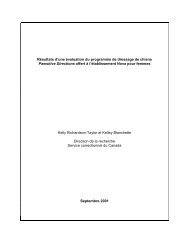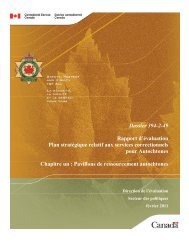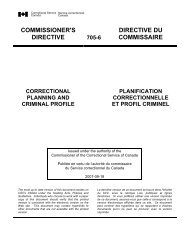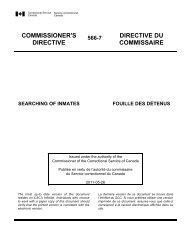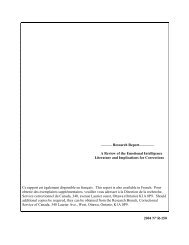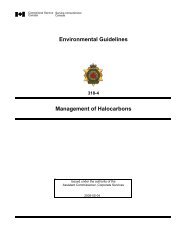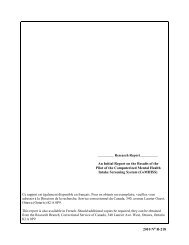Program and Service Needs of Federally Incarcerated Métis ...
Program and Service Needs of Federally Incarcerated Métis ...
Program and Service Needs of Federally Incarcerated Métis ...
You also want an ePaper? Increase the reach of your titles
YUMPU automatically turns print PDFs into web optimized ePapers that Google loves.
currently attached to their <strong>Métis</strong> culture <strong>and</strong> only 6% reported participating in <strong>Métis</strong><br />
activities within the federal facility. It is important to note that low participation was likely<br />
related to a lack <strong>of</strong> <strong>Métis</strong>-related activities inside the institutions. In contrast, larger<br />
proportions reported being involved in other Aboriginal activities inside the institution<br />
(42%) <strong>and</strong> were currently attached to another Aboriginal culture (55%). Past research<br />
demonstrates that First Nations <strong>of</strong>fenders have had a different experience with their<br />
culture inside federal facilities. In comparison to <strong>Métis</strong> <strong>of</strong>fenders in Saskatchewan,<br />
larger proportions <strong>of</strong> First Nations <strong>of</strong>fenders have reported speaking an Aboriginal<br />
language, being attached to their culture <strong>and</strong> participating in traditional activities<br />
(Trevethan et al., 2002a).<br />
Results in the current study appear to suggest that <strong>Métis</strong> <strong>of</strong>fenders had limited exposure<br />
to traditional <strong>Métis</strong> life during their childhood <strong>and</strong> felt little affiliation to their culture. In<br />
addition, <strong>of</strong>fenders did not appear to be involved in <strong>Métis</strong> practices within the<br />
institutions, but large proportions were participating in activities oriented towards First<br />
Nations cultures. Many <strong>of</strong>fenders also felt a strong attachment to First Nations culture.<br />
While there are positive aspects to being involved in spiritual <strong>and</strong> cultural activities,<br />
programs need to acknowledge the diversity <strong>of</strong> Aboriginal cultures present in federal<br />
facilities. Furthermore, the benefits <strong>of</strong> practicing cultural activities that do not reflect the<br />
experiences <strong>of</strong> the clientele remain unclear.<br />
<strong>Program</strong> Participation<br />
Findings from the interviews suggest that <strong>Métis</strong> <strong>of</strong>fenders have participated in a variety<br />
<strong>of</strong> correctional programs. Over three-quarters (79%) reported participating in a program<br />
while incarcerated within the federal system. Figure 4 indicates that the largest<br />
proportions participated in substance abuse (88%). Large proportions also participated<br />
in anger management/family violence (63%), educational (61%), cognitive/living skills<br />
(61%) <strong>and</strong> counselling (46%) programs. Smaller proportions were involved in<br />
employment (34%), sex <strong>of</strong>fender (15%) <strong>and</strong> "other" (5%) programs (see Table 9). In<br />
addition, <strong>of</strong> those who reported being on parole, more than one-half (58%) said they<br />
19




